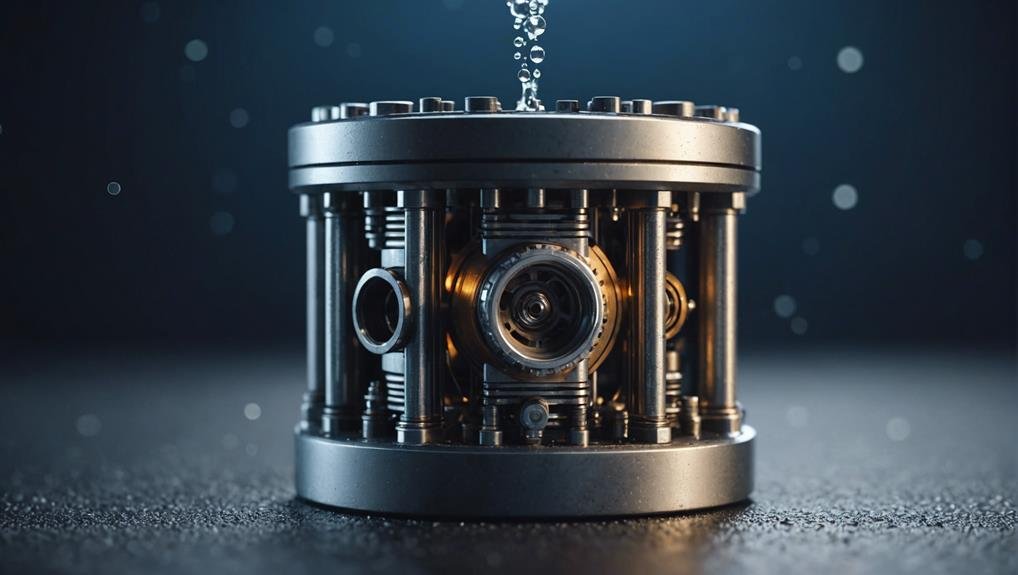As you rely on your engine to power your vehicle, piston rings play a crucial role in ensuring peak performance. They seal the combustion chamber, regulate lubricating oil flow, facilitate heat transfer, and support piston movement and alignment. By doing so, they prevent engine damage, maintain compression and power output, and improve engine efficiency. Without proper function, your engine can suffer from poor performance, increased fuel consumption, and even damage. To understand the full scope of their importance and how to maintain your engine's health, delve further to uncover the intricacies of piston ring function and maintenance.
Key Takeaways
- Piston rings create a gas-tight seal, preventing combustion chamber gas leakage and maintaining compression and power output.
- They regulate lubricating oil flow, preventing excess oil from entering the combustion chamber and reducing emissions.
- Piston rings facilitate heat transfer from the piston to the cylinder walls, preventing engine damage and maintaining efficiency.
- They support piston movement and alignment, ensuring a precise seal and reducing friction and wear on the engine.
- Regular maintenance and upgrading to high-performance rings can enhance engine efficiency and durability.
Functions of Piston Rings Explained
As you delve into the intricacies of your engine, it becomes evident that piston rings play a pivotal role, and understanding their functions is vital for peak engine performance.
These tiny components are responsible for sealing the combustion chamber, which allows your engine to generate power efficiently. The piston rings, situated between the piston and cylinder walls, ensure a gas-tight seal, maintaining the high pressure needed for combustion.
Moreover, they facilitate the transfer of heat from the piston to the cylinder walls, regulating engine temperature and promoting excellent performance. Additionally, piston rings regulate lubricating oil consumption, preventing excess oil from entering the combustion chamber.
By supporting piston movement and alignment, they also prevent engine damage. To summarize, properly functioning piston rings are critical for engine efficiency, power generation, and longevity.
Sealing Combustion Chamber Gases
Your engine's piston rings create a gas-tight seal in the combustion chamber, preventing combustion gases from leaking into the crankcase and ensuring your engine runs efficiently. This seal is vital for maintaining proper compression, maximizing power output, and reducing fuel consumption.
By sealing off the combustion chamber, piston rings guarantee that the engine operates efficiently and effectively. As a result, you'll experience improved engine performance, reduced emissions, and lower fuel bills.
The piston ring's ability to seal combustion gases also diminishes the risk of unburned fuel escaping into the environment, which helps minimize the engine's environmental impact.
Maintaining the integrity of the combustion chamber seal is crucial for the performance and longevity of the engine. A faulty piston ring can lead to decreased engine performance, increased emissions, and reduced fuel efficiency.
Controlling Engine Oil Flow
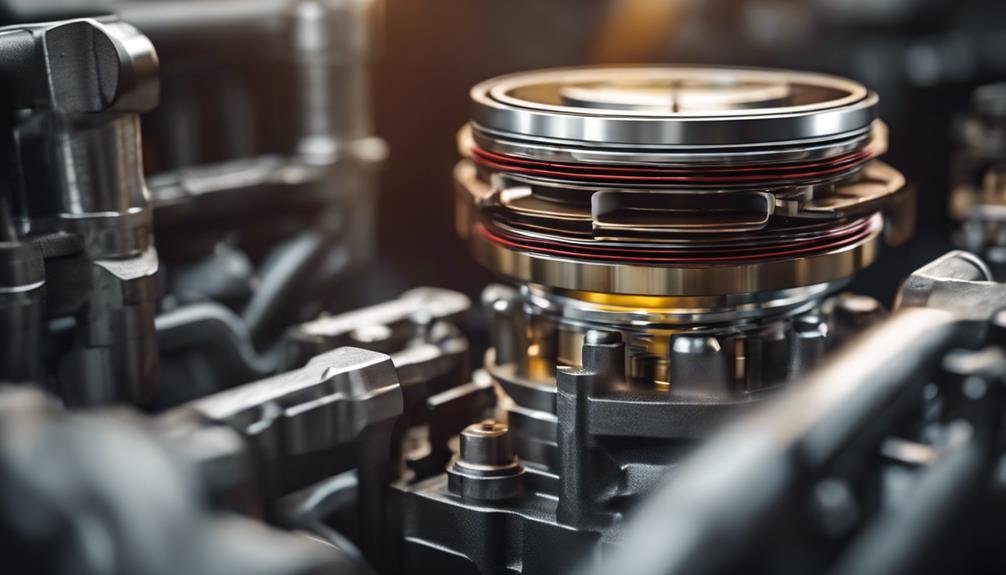
Piston rings play an important role in regulating lubricating oil flow in your engine, preventing excess oil from seeping into the combustion chamber and ensuring proper lubrication. As you know, too much oil in the combustion chamber can lead to increased emissions and decreased engine efficiency.
By scraping excess oil off the cylinder walls, piston rings protect the combustion chamber and maintain ideal oil control. This, in turn, contributes to emission reduction and overall engine efficiency.
You see, the right balance of oil flow is critical, as it helps protect engine components and ensures smooth operation. By regulating oil flow, piston rings create a necessary oil layer for proper lubrication, reducing the risk of engine damage.
Essentially, piston rings play a crucial role in controlling engine oil flow, preventing excess oil from entering the combustion chamber, and maintaining efficient lubrication. By doing so, they contribute to a more efficient and environmentally friendly engine.
Heat Transfer and Dissipation
Efficient heat management is vital to your engine's well-being, and piston rings play a vital role in this process. As you know, excessive heat can lead to engine damage and decreased performance. Piston rings aid in transferring heat from the piston to the cylinder walls, preventing overheating. This heat transfer function helps in maintaining stable temperatures within the engine, ensuring ideal engine performance and longevity.
Here are some key benefits of efficient heat transfer and dissipation:
- Prevents engine damage: Proper heat dissipation prevents damage to engine components due to excessive heat.
- Maintains engine efficiency: Efficient heat transfer ensures ideal engine performance, which is critical for engine efficiency.
- Supports overall engine health: Heat transfer and dissipation are critical for maintaining stable temperatures, which is vital for overall engine health.
Supporting Piston Attitude Alignment
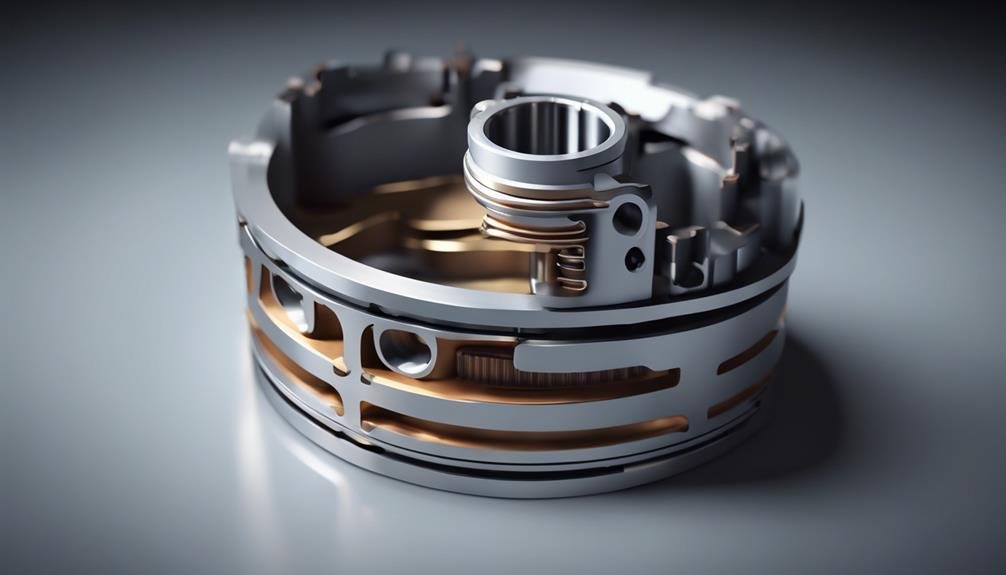
As you maintain peak engine performance, piston rings play an important role in supporting piston attitude alignment, ensuring the piston moves smoothly within the cylinder. This alignment is vital, as it prevents piston-cylinder wall contact, which can lead to engine damage.
A piston ring helps maintain this alignment by creating a precise seal between the piston and cylinder wall, allowing the piston to move freely. The ring design ensures a tight seal, which is necessary for top engine performance.
By supporting the piston's movement, the piston ring helps avoid engine damage by keeping the piston properly aligned within the cylinder. This alignment is critical, as it ensures the piston maintains the correct attitude, allowing for smooth engine operation.
With the piston ring's support, the piston can move smoothly, reducing friction and wear on the engine. By understanding the role of piston rings in supporting piston attitude alignment, you can better appreciate the importance of these small but critical components in maintaining top engine performance.
Effects of Worn-Out Piston Rings
When you neglect to replace worn-out piston rings, you'll likely notice a significant drop in your engine's power and efficiency, accompanied by some telltale signs of trouble. As the piston rings wear out, they allow combustion gases to escape, reducing compression and engine performance. This can lead to a decrease in fuel efficiency and an increase in oil consumption.
Some common effects of worn-out piston rings include:
- Reduced engine performance, resulting in decreased power and efficiency
- Increased oil consumption, as the rings allow oil to seep into the combustion chamber
- Presence of blue smoke from the exhaust, indicating that oil is being burned along with the fuel
If you continue to ignore the worn-out piston rings, you may experience more severe consequences, such as stuck rings, which can lead to carbon deposits and further reduce engine performance.
Regular maintenance and prompt replacement of worn piston rings are essential for maintaining top-notch engine performance and efficiency.
Identifying Piston Ring Failure Symptoms
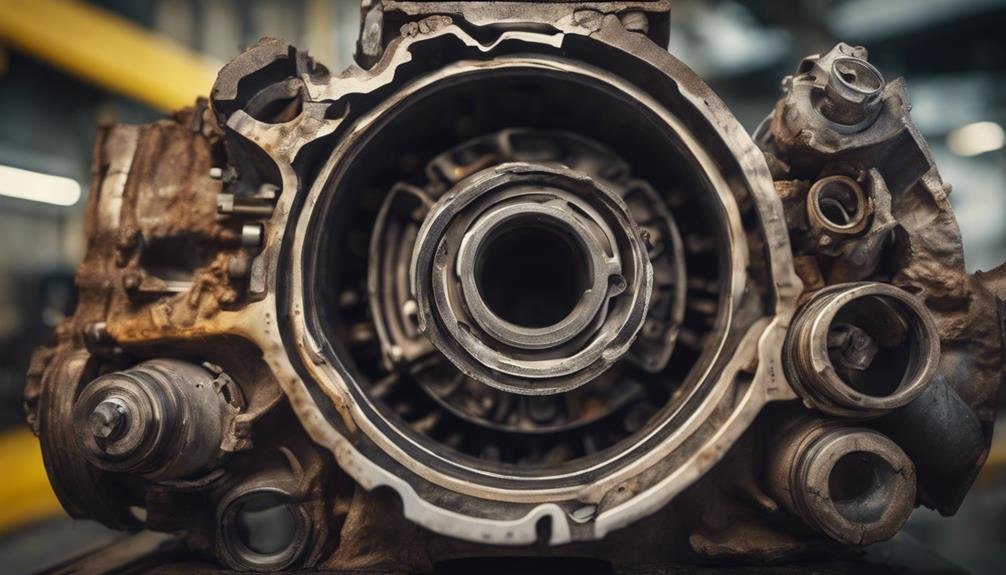
Recognizing piston ring failure is crucial, as it's important to watch for specific symptoms, including excessive blue smoke from the exhaust, reduced engine power, and hard starting. These signs often indicate that your piston rings are worn out or damaged, compromising your engine's performance.
When piston rings fail, they allow combustion gases to escape from the cylinder, resulting in decreased engine power and reduced fuel efficiency. You may also notice that your engine struggles to start, especially when cold, due to low compression. This is because the faulty piston rings allow the fuel-air mixture to escape, making it difficult for the engine to generate enough power.
Moreover, you might notice oil consumption increases as the piston rings allow oil to seep into the combustion chamber. By recognizing these symptoms, you can take prompt action to address the issue and prevent further damage to your engine.
Addressing piston ring failure promptly is crucial to avoid more severe engine problems down the road.
Causes of Piston Ring Damage
Excessive heat, poor lubrication, and contaminants in the engine oil are just a few of the culprits that can cause piston ring damage. As you're driving, these factors can quietly wreak havoc on your engine, leading to costly repairs down the line. You mightn't even realize it's happening until it's too late.
Some specific causes of piston ring damage include:
- Incorrectly installed or gapped piston rings, which can lead to uneven wear and tear
- Over-revving the engine, which puts excessive stress on the piston rings
- Contaminants in the engine oil, which can scratch or corrode the piston rings over time
Poor lubrication, in particular, is a common culprit regarding piston ring damage. When the engine oil is old, dirty, or of poor quality, it can't properly lubricate the piston rings, leading to accelerated wear and tear.
Importance of Regular Maintenance
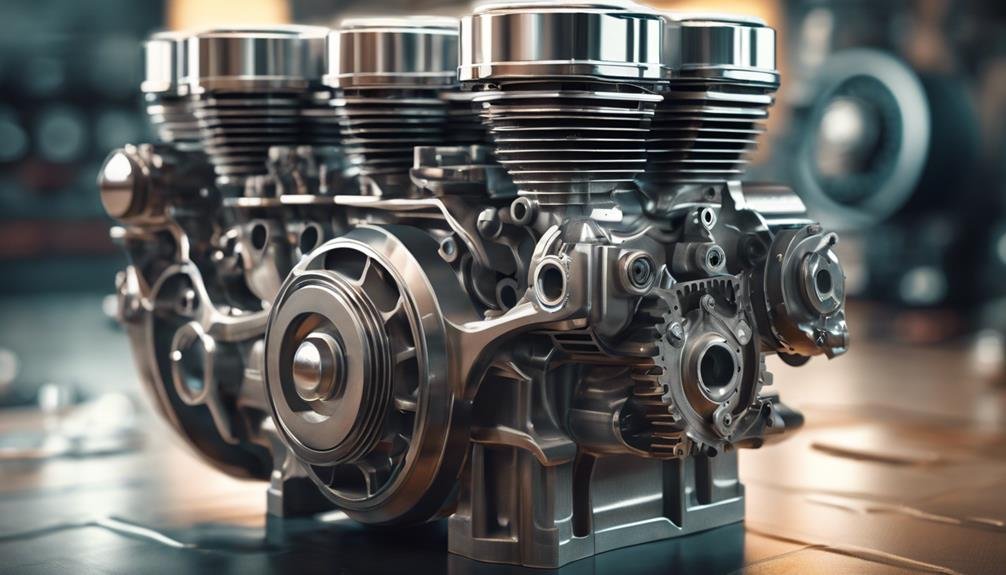
Regular maintenance is the key to maximizing your engine's full potential, and it begins with giving your piston rings the care they need to thrive. By regularly checking and maintaining your piston rings, you can guarantee proper engine compression, prevent excessive oil consumption, and maintain peak engine performance. Neglecting regular maintenance can lead to costly repairs and even engine failure.
Here's a breakdown of the benefits of regular piston ring maintenance:
| Benefit | Description |
|---|---|
| Extended Engine Life | Proper maintenance can prolong the lifespan of your engine |
| Peak Performance | Regular checks ensure top engine compression and performance |
| Cost Savings | Early detection of worn rings prevents costly repairs |
Upgrading to High-Performance Rings
By upgrading to high-performance piston rings, you can take your engine's performance to the next level, building on the solid foundation of regular maintenance. This upgrade can greatly enhance your engine's efficiency, power output, and longevity. High-performance piston rings are designed to provide better sealing and compression efficiency, which can result in increased power output and reduced emissions.
Some benefits of upgrading to high-performance piston rings include:
- Improved heat transfer from the piston to the cylinder walls, reducing engine temperatures and enhancing overall efficiency
- Reduced oil consumption and emissions, making your engine more environmentally friendly
- Increased durability and longevity, thanks to advanced materials like steel or ductile iron
Frequently Asked Questions
What Happens if Piston Rings Are Bad?
If your piston rings are bad, you'll likely notice excessive oil consumption, blue smoke from the exhaust, and hard starts due to reduced compression, which will ultimately diminish your engine's power and general performance.
What Is the Main Function of Piston Rings?
You might wonder, what's the main function of piston rings? Well, they primarily prevent oil from entering the combustion chamber during engine operation, regulating oil consumption and scraping excess oil from cylinder walls.
How Much Does It Cost to Replace Piston Rings?
You're wondering how much it'll cost to replace piston rings in your vehicle. On average, parts cost between $40 to $200, and labor costs range from $200 to $1000, depending on your car's make and model.
How Does Piston Rings Position Affect Engine Performance?
You need to know that incorrect piston ring positioning directly affects engine performance, causing reduced compression, increased oil consumption, and potential engine damage, so it's essential to get it right to maintain peak engine efficiency.
Conclusion
Now that you've learned about the essential role of piston rings in your engine, it's clear they're much more than just a tiny component.
By sealing combustion chamber gases, controlling engine oil flow, transferring heat, and supporting piston attitude alignment, piston rings play a critical part in ensuring your engine runs smoothly and efficiently.
Remember to stay on top of maintenance and consider upgrading to high-performance rings to get the most out of your engine.
